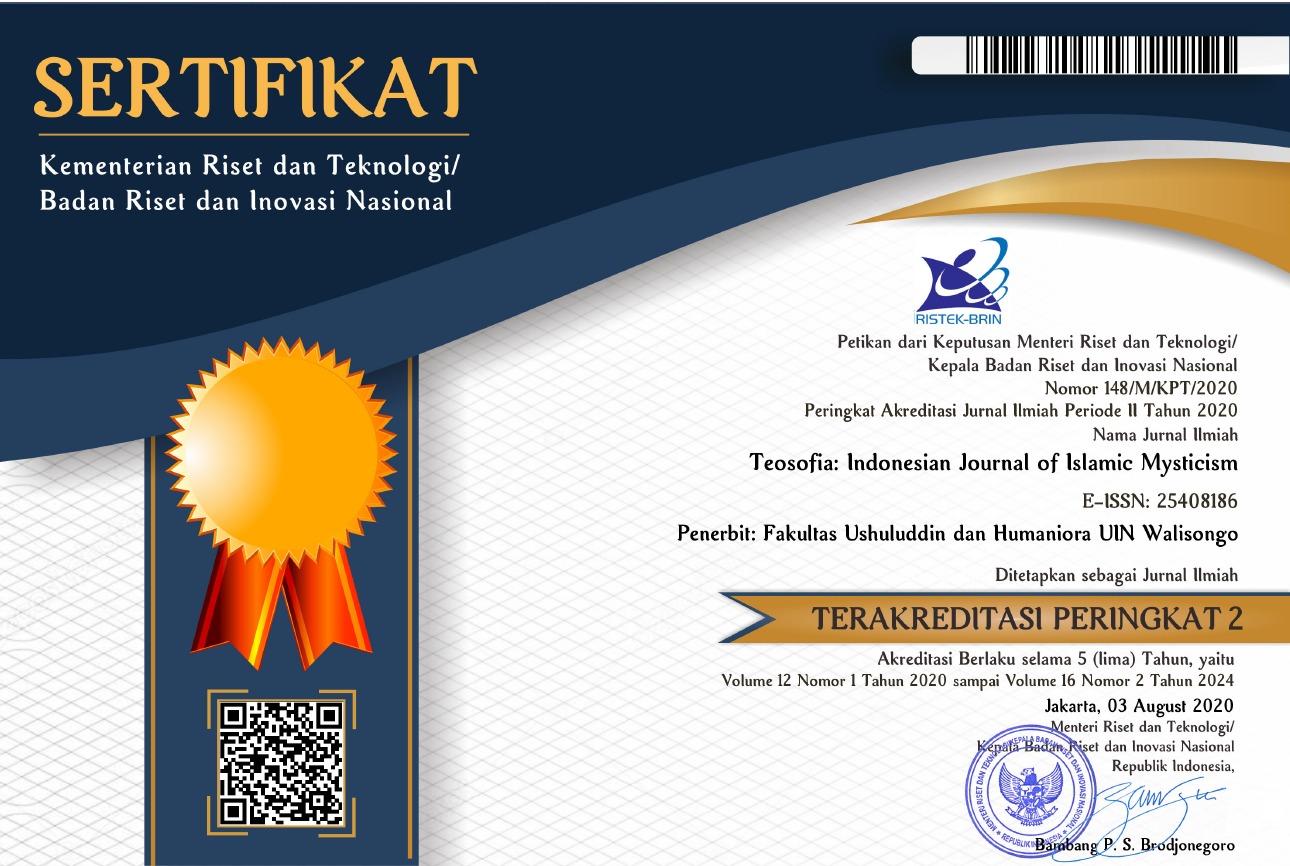A Critical Analysis of the Response of Ilorin Sufi Scholars to Anti-Sufi Uprising in the Seventies in Nigeria
DOI:
https://doi.org/10.21580/tos.v12i1.14504Keywords:
bid’ah, izālah, Ilorin, Wahabism-Salafism, SufismAbstract
Sufism has been trailed by different criticisms for a long period. Different Muslim communities across the Muslim world have experienced anti-Sufism drives but launched in Nigeria in the seventies as it was inaugurated and coordinated by Shaykh Abubakar Mahmud Gumi, who acted under the guise and influence of Wahhābiyya-Salafiyya. As a result, Sufis across communities started responding by either preaching or writing. Sufi scholars in Ilorin, a border community between the North and South, were among the early responders to anti-Sufism who took to writing. Therefore, this paper is a critical analysis of the contents of Rafḍ al-Shubuhāt, written as a response to anti-Sufi waves in the city. An exegetical method of research was adopted to determine the appropriateness of the Sufi scholars to the anti-Sufism campaign in the metropolis. The findings revealed that most of the Salafiyya’s claims are unfounded and lack the proof to establish their genuineness, while the responses of the Sufi are not only appropriate but are also laced with evidence from the Qur’an, Ḥadīth, and submissions of different scholars, some of whom were Salafiyya scholars. The book is therefore recommended for the defence of Sufism in contemporary times.
Contribution: This study contributes to revealing the efforts to tackle the anti-Sufism movement initiated by Sufis scholars in Ilorin Nigeria, by writing a book entitled Rafḍ al-Shubuhāt, as a counter-opinion.
Downloads
References
Ad-Dhahabi, Shamsu ad-Din. Siyar A’lām Nubalā’. Vol. 8. Cairo: Darul-Ḥadīth, n.d.
Al-’Ashmāwī, Abdul-Bari Ahmad. Matnu Al-’Ashmāwiyyah. Al-Maktabah As-Shamilah, n.d.
Al-Makki, Shaykh Abd al-Hafiz. Mawqif Aimmat Al-Harakat Al-Salafiyyah Min Al-Tasawwuf Wa Al-Sufiyyah. Cairo: Dar as-Salam, 2001.
Al-Qurtubi, Shamsu ad-Din. Tafsir Al-Qurtubi. Vol. 2. Cairo: Darul-Kutubi al-Misriyyah, 1964.
Al-Zuhayli, Wahbah. Al-Fiqh Al-Islāmī Wa Adillatuhu. Vol. 9. Al-Maktabah As-Shamilah, n.d.
Albani, Muhammad Nasir al-Din. Ahkam Al-Jana’iz Wa-Bida`uha. Riyadh: Maktabah al-Islami, 1986.
An-Nufawi, Muhammad Ibrahim, and Ali Abubakar Jabata. Raf Ash-Shubuhat ’amma Fi Al-Qadiriyya Wa Tijaniyya Min Ash-Shatahat. Lagos: Islamic Cultural Press, 1978.
As-Saleh, Saleh. “Sufism: Origin and Development.” AbdurRahman.Org, 2005. https://abdurrahmanorg.files.wordpress.com/2014/08/sufism-origin-and-development-dr-saleh-as-saleh.pdf.
As-Shawkāni, Muhammad Ali Muhammad. Fatiḥ ’l-Qadīr. Vol. 1. Al-Maktabah As-Shamilah, n.d.
ash- Shatibi, Abu Ishaq Ibrahim bin Musa. Al-I’tisam. Saudi Arabia: Darul-Ibn Affan, 1992.
Cisse, Sayyid ’Alī. The Removal of Confusion Concerning the Flood of the Saintly Seal Ahmad Al-Tijani (Kashif Al-Ilbas an Fayda Al-Khatm Abi’ Abbas). Translated by Zachary Wright, Muhtar Holland, and Abdullahi El-Okene. Fons Vitae, 2009.
Gumi, Abubakar Mahamud. Al-’Aqīdatu Aṣ-Ṣaḥīḥah. Beirut: Darul-Arabiyyah, 1972.
Hassan, Ibrahim Haruna. An Introduction to Islamic Movements and Modes of Thought in Nigeria. Evanston: Northwestern University Library, 2015.
https://islamqa.info/. “ضوابط التكفير,” 2007. https://islamqa.info/ar/answers/85102/ضوابط-التكفير.
Ibn Arabiy, Ali Harazim. Jawāhiru Al-Ma’ānī. Beirut: Dar al-Fikr, 2001.
Ibn Bāz, Abdul-Aziz Abdullahi. Majmū’ Fatāwā. Vol. 3. Al-Maktabah As-Shamilah, n.d.
Ibn Kathir, Ismail. Tafsir Ibn Kathir. Vol. 1. Beirut: Daru Tibah, 1999.
Ibn Qayyim, Muhammad ibn Abubakar. Madāriju As-Sālikīn. Vol. 1. Al-Maktabah As-Shamilah, n.d.
Ibn Taymiyyah, Ahamd Abdul-Halim. Majmū’ Al-Fatāwā. Vol. 10. Al-Maktabah As-Shamilah, n.d.
Ibrahim, Abdullahi. “At-Tawwur ’d-Dirāsāt ’l-’Arabiyyah Fi ’d-Diyār ’n-Nufawiyyah Binijiriyyah.” University of Ilorin, Ilorin, Nigeria, 2006.
Ishaaq, Aboo Aamir Al-Atharee. “All of Sufism Is Misguidance.” https://simplysalafiyyah.com, 2013. https://simplysalafiyyah.com/ebooks.php?start=40.
Kaura, J. M. “Relevance of Qadiriyya Sufism in the Jihad and Its Moderative Effect on the Leadership of the Sokoto Caliphate.” In Conference Marking the Installation of the 19th Sultan of Sokoto. Sokoto: Usmanu Danfodiyo University, 1996.
Olayiwola, Abdul Fattah. Islam in Nigeria: One Crescent Many Focuses. Lagos: Sakirabe Publishers, 2007.
Quadri, Yasir Anjola. “A Study of the Izalah, a Contemporary Anti-Sufi Organisation in Nigeria.” Orita: Ibadan Journal of Religious Studies 17, no. 2 (1985): 95–108.
———. “The Tijaniyyah in Nigeria: A Case Study.” University of Ibadan, Nigeria, 1981.
Renard, John. The A to Z of Sufism. Toronto: Scarecrow Press, 2009.
Saleh, Ibrahim. At-Takfir. Maiduguri, 1998.
Sambo, Abdul Qadiri. “Shaykh Adam Abdullahi Al-Ilori: His Life and Works.” University of Ilorin, 1981.
Thānawī, Mawlānā Ashraf ʿAlī. A Sufi Study of Ḥadīth. Translated by Shaykh Yusuf Talal Delorenzo. London: Turath Publishing, 2010.
Yusuph, Dauda Gambari. “A Discourse on the Sufi’s Concept of Sainthood (Al- Wilayah) Concerning Ḥadīth Thirty-Eight (38) of An-Nawawī’s Forty Ḥadīth.” A Journal of Islamic Sciences and Muslim Development 1, no. 1 (2020).
———. “An Examination of the Selected Salafiyyah Scholars Discourse on Sufism.” University of Ilorin, 2018.
Downloads
Published
How to Cite
Issue
Section
License
Copyright
The copyright of the received article shall be assigned to the journal as the publisher of the journal. The intended copyright includes the right to publish the article in various forms (including reprints). The journal maintains the publishing rights to the published articles. Therefore, the author must submit a statement of the Copyright Transfer Agreement.*)
Licensing

This work is licensed under a Creative Commons Attribution-ShareAlike 4.0 International License.
In line with the license, authors are allowed to share and adapt the material. In addition, the material must be given appropriate credit, provided with a link to the license, and indicated if changes were made. If authors remix, transform or build upon the material, authors must distribute their contributions under the same license as the original.
_______
*) Authors whose articles are accepted for publication will receive confirmation via email and send a Copyright Transfer Agreement.








